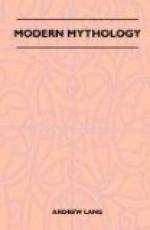Why Men are Mortal
The myths of the Origin of Death fall into a few categories. In many legends of the lower races men are said to have become subject to mortality because they infringed some mystic prohibition or taboo of the sort which is common among untutored peoples. The apparently untrammelled Polynesian, or Australian, or African, is really the slave of countless traditions, which forbid him to eat this object or to touch that, or to speak to such and such a person, or to utter this or that word. Races in this curious state of ceremonial subjection often account for death as the punishment imposed for breaking some taboo. In other cases, death is said to have been caused by a sin of omission, not of commission. People who have a complicated and minute ritual (like so many of the lower races) persuade themselves that Death burst on the world when some passage of the ritual was first omitted, or when some custom was first infringed. Yet again, Death is fabled to have first claimed us for his victims in consequence of the erroneous delivery of a favourable message from some powerful supernatural being, or because of the failure of some enterprise which would have resulted in the overthrow of Death, or by virtue of a pact or covenant between Death and the gods. Thus it will be seen that death is often (though by no means invariably) the penalty of infringing a command, or of indulging in a culpable curiosity. But there are cases, as we shall see, in which death, as a tolerably general law, follows on a mere accident. Some one is accidentally killed, and this ‘gives Death a lead’ (as they say in the hunting-field) over the fence which had hitherto severed him from the world of living men. It is to be observed in this connection that the first of men who died is usually regarded as the discoverer of a hitherto ‘unknown country,’ the land beyond the grave, to which all future men must follow him. Bin dir Woor, among the Australians, was the first man who suffered death, and he (like Yama in the Vedic myth) became the Columbus of the new world of the dead.




